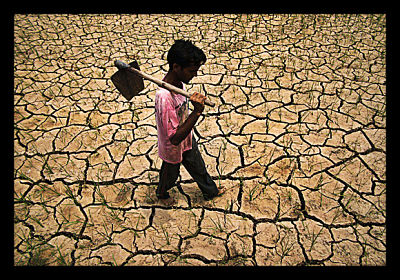Climate Change and the World’s Poor

The individuals and families of developing nations that have contributed little to climate change will nonetheless experience its greatest hardships. The World Bank warns that Earth’s rising temperature is undermining economic development in poor countries. Droughts, floods, heatwaves, rising sea levels, and powerful storms will cause severe devastation in areas that are already poor or were coming out of poverty. Within just two decades, climate change is expected to cause food shortages in these same areas.
An increase of at least 2°C, the limit set by scientists that marks a catastrophic and irreversible change to the climate, is inevitable if current trends continue. Although some refuse to regard climate change as anything other than a future problem, many parts of the world are already experiencing extreme challenges due to rising temperatures.
Jim Yong Kim, president of the World Bank, warns that: “The scientists tell us that if the world warms by 2°C—warming which may be reached in 20 to 30 years—that will cause widespread food shortages, unprecedented heatwaves, and more intense cyclones.”
In Southeast Asia, catastrophic events such as the floods in Pakistan in 2010, which affected the lives of 20 million people, could become the norm, while changes to the monsoon season could be detrimental to Indian farmers. In Sub-Saharan Africa, researchers found that food security will be a major challenge, accompanied by dangers from droughts, flooding, and shifts in rainfall. It is predicted that farmers of this region will lose 40-80% of current farmland used primarily for growing their most stable crop: maize.
The World Bank plans to increase funding to countries currently without the capabilities to adapt to the consequences of climate change. Its aid has doubled from $2.3 billion in 2011 to $4.6 billion last year. An additional $7 billion a year is used to help poor countries cut their greenhouse gas emissions and work towards an environmentally sustainable economy. The bank is calling for rich countries to increase their efforts in cutting current greenhouse gas emissions. The need to avoid 2°C of warming is being emphasized, which scientists say is possible if countries cut their emissions in the near future.
According to Kim, “At the World Bank Group, we are concerned that unless the world takes bold action now, a disastrously warming planet threatens to put prosperity out of reach of millions and roll back decades of development…in response, we are stepping up our mitigation, adaptation, and disaster risk management work, and will increasingly look at our business through a ‘climate lens’.”
– Ali Warlich
Source: The Guardian, World Bank, Huffington Post
Photo: Business Insider
